Are you experiencing weight loss, fatigue, irritability, or hair loss?
These are all symptoms that you may have an overactive thyroid.
Identifying an overactive thyroid is important because early detection can prevent long-term damage.
Learn more about the signs and symptoms of an overactive thyroid, what causes this condition, how to treat it, and more in this guide…
What Exactly is an Overactive Thyroid?
An overactive thyroid is exactly as it sounds.
It’s the medical condition in the body that results in the overproduction of thyroid hormone from your thyroid gland.
More specifically, patients with an overactive thyroid often present with lower than normal TSH levels (Thyroid Stimulating Hormone) and higher than normal Free T3 levels.
Does having a little bit of extra thyroid hormone in your body really promote a problem for you?
Won’t it lead to weight loss?
Well, maybe, but that doesn’t mean it’s something that you actually want to happen!
Remember:
Your thyroid helps to control very important functions in your body such as metabolism regulation, adrenaline release, heat, and energy production, cholesterol synthesis, heart rate, and so on.
The overstimulation of these important systems may result in some weight loss, but at the cost of several other potentially damaging symptoms as well.
Because of this, you will most definitely want to have your thyroid evaluated and treated (if necessary).
Your thyroid is also important because it acts as the master hormone which helps regulate other hormonal systems in the body.
Small changes in thyroid serum levels may result in big changes in other hormones as well.
This is why patients with thyroid disorders often present with multiple symptoms all across their bodies.
These problems often start out with symptoms such as heart palpitations (or a rapid heart rate) and change into heart problems such as atrial fibrillation.
The good news is that if you have an overactive thyroid you will present with symptoms that can clue you into what is happening.
These symptoms often cause patients to seek medical care which results in diagnosis and treatment.
How you approach treatment is a different story and one which we will discuss below.
So what kind of symptoms should you expect if you have an overactive thyroid?
DOWNLOAD FREE RESOURCES
Foods to Avoid if you Have Thyroid Problems:
I’ve found that these 10 foods cause the most problems for thyroid patients. Learn which foods you should avoid if you have thyroid disease of any type.
The Complete List of Thyroid Lab tests:
The list includes optimal ranges, normal ranges, and the complete list of tests you need to diagnose and manage thyroid disease correctly!
Signs and Symptoms Your Thyroid is Too Active
Remember that your thyroid helps control the activity of most of the cells and tissues in your body.
This can be a way to help you figure out what is going on.
Imagine if you simply activate or overactive the cells and tissues in your body, how would you react?
Using this logic we can figure out exactly how patients with an overactive thyroid would present:
If you activate your heart cells too much you’ll end up with a rapid heart rate or heart palpitations.
If you activate your bones too much you’ll increase bone turnover and end up with bone loss and osteoporosis.
If you activate your gastrointestinal tract too much you’ll end up with diarrhea or loose stools.
If you activate the neurons in your brain you’ll end up with increased brain activity and anxiety or panic attacks.
ALL of these symptoms (and more listed below) tend to be associated with overactive thyroid activity.
You can find the complete list of symptoms associated with an overactive thyroid below:
- Weight loss
- Increased appetite
- Rapid heart rate
- Heart palpitations
- Heart enlargement
- Insomnia
- Fatigue
- Panic attacks
- Anxiety
- Hair loss (often associated with dry brittle hair)
- Menstrual problems (rapid menstrual cycle)
- Warm skin
- Hot flashes
- Feeling jittery
- Irritability
- Tremors
- Protrusion of the eyes (if associated with Graves’ disease)
It’s also important to understand two things:
#1. Some of these symptoms may be associated with other medical conditions or caused by certain medications.
Common medical conditions, such as Menopause, may cause some similar symptoms such as hair loss, weight gain, and even hot flashes.
The similarity of symptoms between these conditions can be confusing, but the good news is that you can tease out the difference with simple lab tests.
#2. The degree of symptoms that you experience will vary based on the AMOUNT of thyroid hormone you are producing.
This one is very important because some patients may only experience MINOR symptoms compared to other individuals.
Because your symptoms may not be as strong as other people means that you need to be very aware of your body and how you are feeling.
A strong intuition should be used if you suspect you have an overactive thyroid, even if you don’t experience all of the symptoms listed above.
You may be in the early stages of developing an overactive thyroid and you might be able to initiate early treatment if you can diagnose your condition early.
Evaluating your thyroid lab tests is an easy way to determine if you have an overactive thyroid.
What Causes an Overactive Thyroid?
Excess thyroid production is most often the cause of an autoimmune disease known as Graves’ disease.
This condition results in hyperthyroidism (another name for an overactive thyroid) due to stimulation of the thyroid gland.
In Graves’ disease, your body produces antibodies, known as thyroid-stimulating immunoglobulin, which attaches to your thyroid gland and initiates the production of thyroid hormone.
Normally, when thyroid levels increase, your body can shut off excess production.
But the presence of these antibodies causes constant stimulation of your thyroid gland which results in the symptoms we listed above.
But Graves’ disease is not the only cause of this condition.
Some patients may experience an increase in thyroid hormone from nodules that ignore normal feedback loops.
This condition is known as toxic multinodular goiter.
Other conditions, such as tumors that produce TSH (thyroid stimulating hormone) can also initiate the same response.
The conditions we listed above tend to cause a sustained and chronic increase in thyroid hormone over time.
But there are other conditions that temporarily cause an overactive thyroid (some of which can actually completely go away over time without treatment).
These conditions include thyroiditis (in some cases) and excessive supplementation with nutrients such as iodine.
Thyroiditis is worth mentioning because it can cause a very confusing clinical picture and one that causes alternating stages of both an overactive thyroid and an underactive thyroid.
This rollercoaster, which is seen in conditions such as Hashimoto’s thyroiditis, can be VERY confusing for patients.
For several weeks they may experience the symptoms associated with an overactive thyroid, but within a few days to weeks, they may go in the opposite direction and crash with fatigue, weight gain, depression, and so on (symptoms of hypothyroidism).
Thyroiditis can be triggered by trauma to the thyroid or may be experienced after pregnancy.
Some patients may only experience mild symptoms as well, which can make diagnosis difficult.
Most overactive thyroid conditions lead to an underactive thyroid over long periods of time and some may go away with little to no treatment.
You can learn more about thyroiditis here.
Most of the time, however, the causes of an overactive thyroid are not temporary and may require long-term treatment.
How do you Treat it?
The goal of treating an overactive thyroid is two-fold:
First to block thyroid hormone production in an attempt to “normalize” thyroid levels in the body.
And second, to fix the underlying problem (if possible).
Fixing the underlying problem is always the best way to go, but some conditions are not necessarily “fixable”.
For instance:
Even though you may know that your overactive thyroid is caused by Graves’ disease you may not be able to get your immune system under control, even with natural therapies and treatments.
Patients who fall into this category may require more long-term treatments such as radioactive iodine ablation or complete removal of the thyroid gland.
You can find a complete list of treatments for overactive thyroid below:
- Beta Blockers – Beta blockers can help reduce the symptoms of hyperthyroidism by blocking thyroid function at the cellular level. Beta-blockers help to reduce heart palpitations, tremors, and anxiety through this effect. Beta-blockers are not a long-term solution for an overactive thyroid but they can help reduce symptoms.
- AntiThyroid Medication – Antithyroid medication (such as methimazole and PTU) helps block thyroid production and thyroid conversion. These medications are primarily used to try and “balance” the thyroid by slowing it down. The difficulty with these medicines is that they are difficult to manage and dose and may lead to over-blocking of the thyroid gland and to symptoms of hypothyroidism. Long-term use of these medications may also cause negative side effects. So, while this treatment is effective, it’s not necessarily a long-term solution for everyone.
- Complete Thyroidectomy – In some cases, a complete thyroidectomy may be recommended. A thyroidectomy is the surgical removal of part or all of your thyroid gland. If you remove the thyroid gland then you will automatically reduce thyroid hormone production. Removing the thyroid gland leaves the patient reliant upon thyroid medication for life (remember that without thyroid hormone you can die from a myxedema coma). Patients who have their thyroid gland removed switch from having an overactive thyroid to an underactive thyroid (simply because the thyroid has been removed). After this procedure patients will need to have their thyroid medication adjusted and tested frequently.
- Radioactive Iodine Ablation – Or RAI for short is another procedure that causes direct and irreversible damage to the thyroid gland. The goal of this therapy is to destroy the thyroid gland (without taking it out) to prevent thyroid hormone production. Most patients who undergo RAI will require thyroid medication for the rest of their life much like those who have their thyroid removed. In terms of effectiveness, RAI can be compared to a complete thyroidectomy. Both RAI and Thyroidectomy are long-term treatments for hyperthyroidism or an overactive thyroid.
- Natural Therapies – Natural therapies can also be used either by themselves or in conjunction with the other therapies listed above. Natural therapies include dietary changes, supplementation with specific nutrients, the use of certain medications (such as LDN), and the use of high doses of Iodine. You can learn more about natural therapies here.
The exact type of treatment or therapy that you need will depend on your individual situation.
You can discuss all of these options with your current Doctor.
Please also note that not all patients are great candidates for natural treatments for an overactive thyroid.
In some cases, it may be dangerous to forgo conventional hyperthyroid therapies in favor of more natural therapies.
This is especially true in cases such as Thyroid Storm, which is a medical emergency and must be treated rapidly.
Natural therapies are often best when used in conjunction with traditional and conventional therapies.
Is it possible to gain weight if you have an Overactive Thyroid?
Something that can be confusing to patients is the fact that it is possible to have an overactive thyroid but also experience weight gain.
This is confusing because an overactive thyroid should lead to weight loss, at least that’s one of the main symptoms associated with this condition.
So how is it possible to gain weight?
The answer comes when we discuss how an overactive thyroid is treated.
The treatment for hyperthyroidism or excessive thyroid hormone production is to BLOCK this from happening.
What happens if you block thyroid hormone production and conversion?
You turn an overactive thyroid into an UNDERactive thyroid (also known as hypothyroidism).
And this makes sense if you think about it for a minute:
The goal when treating an overactive thyroid is to block how much thyroid hormone your body is using.
But is your Doctor going to be able to perfectly balance thyroid hormone production and conversion in your body with medication?
Probably not.
And the logic goes that as long as you are not overactive it’s okay to be a little bit underactive.
But the problem with having an underactive thyroid is that you potentially switch from losing weight to gaining weight.
So the weight gain is from the TREATMENT of your thyroid, not secondary to the overactive thyroid itself.
It’s better to think about weight gain as a consequence of treatment rather than a side effect or symptom of having an overactive thyroid.
You can find some tips and tricks to help manage your weight in this post here if you suffer from an overactive thyroid.
Final Thoughts + Your Next Steps
The bottom line?
An overactive thyroid is a potentially serious disease that results from too much thyroid hormone production in your body.
This production is usually caused by an autoimmune disease such as Graves’ disease, but it can also be caused by other less common conditions as well.
Occasionally, some patients may experience transient (temporary) bouts of an overactive thyroid with disease states such as Hashimoto’s thyroiditis.
It’s important to identify an overactive thyroid so that you can undergo proper treatment to prevent long-term damage to your heart and bones.
Natural therapies for hyperthyroidism may work for some people, but be careful when using these therapies.
If you suspect you have an overactive thyroid your next step should be to consult with your physician and get some basic thyroid labs.
Labs such as your TSH, Free T3, and Free T4 can easily identify hyperthyroidism in the majority of patients.
Now I want to hear from you:
Are you suffering from the symptoms of an overactive thyroid?
Do you have a diagnosis of Graves’ disease or hyperthyroidism?
Are you undergoing treatment and suffering from weight gain?
Leave your comments below!
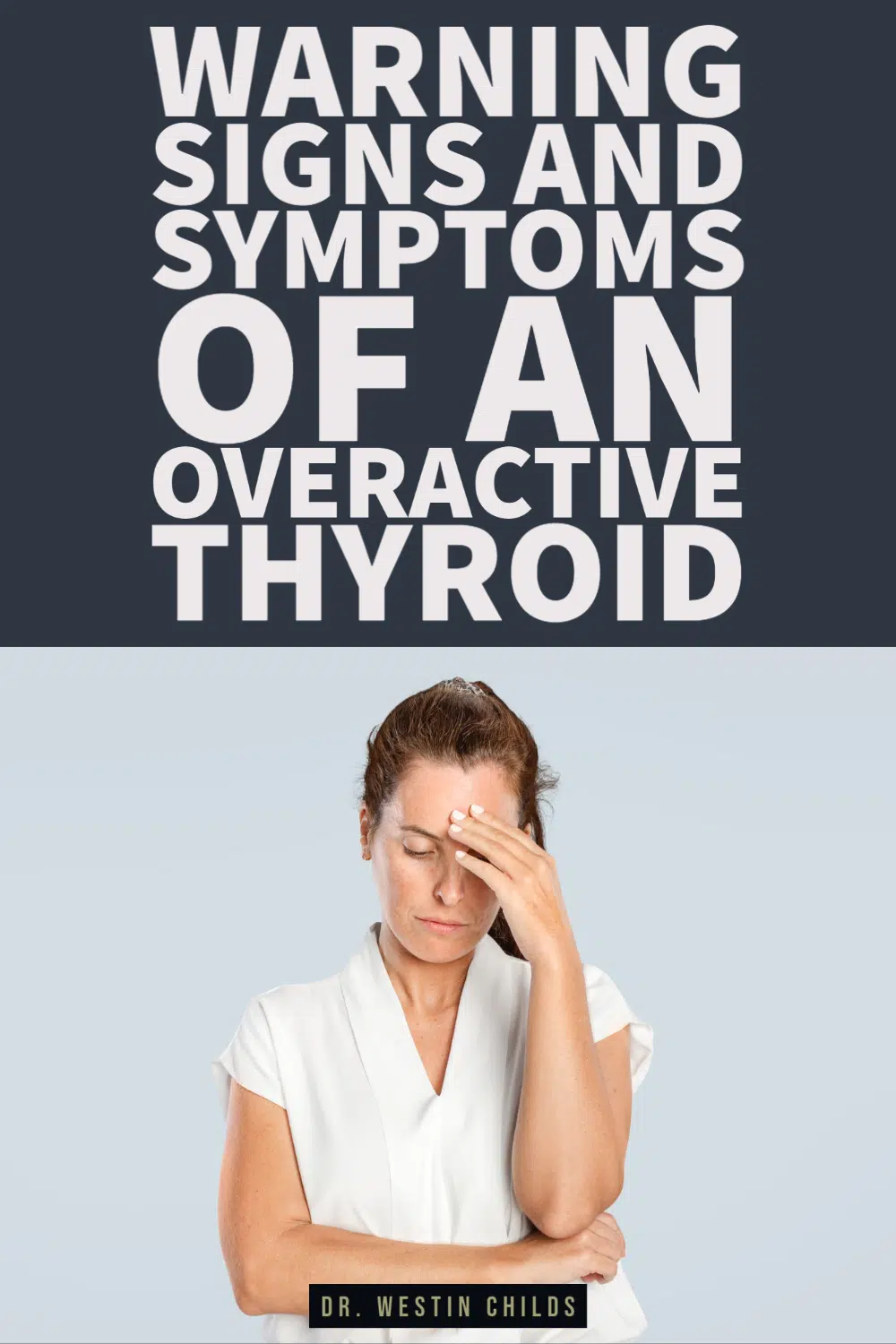
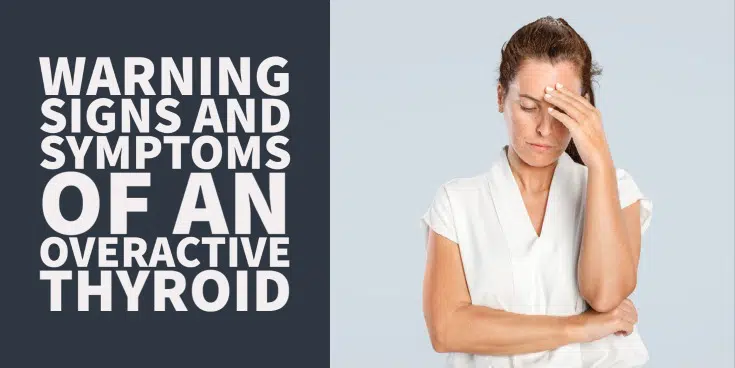

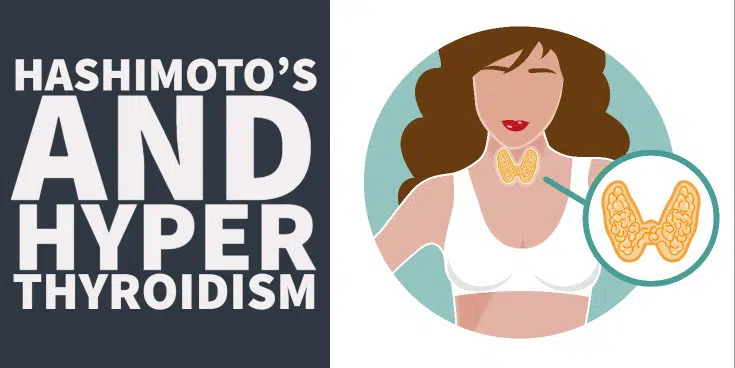
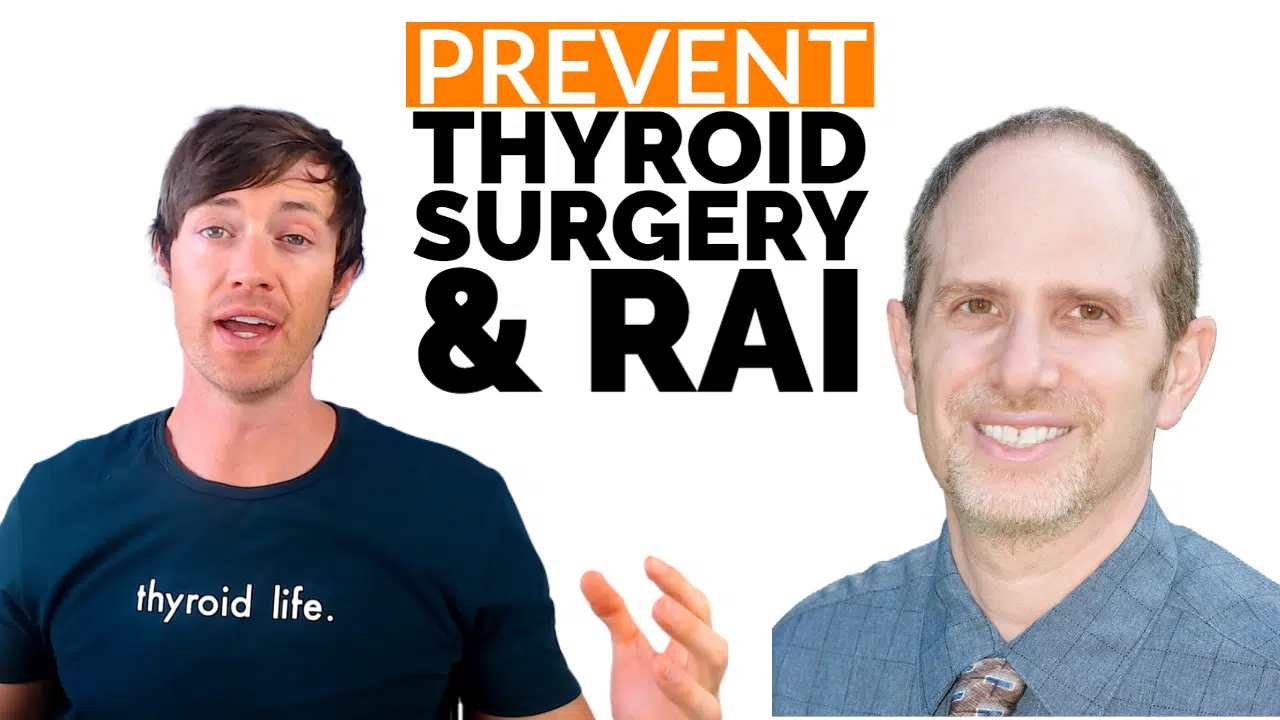


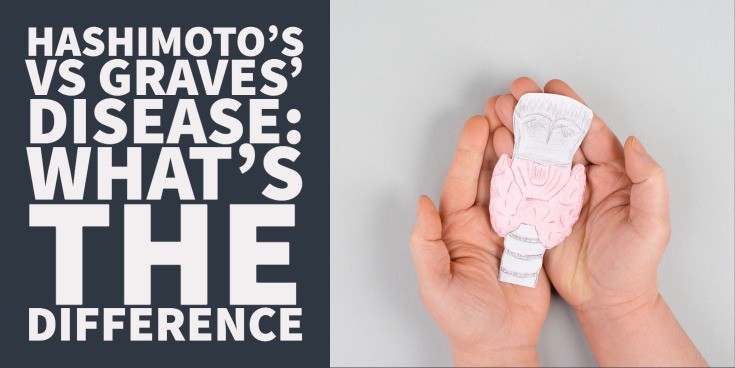

Over last six months, I lost approximately 45 pounds. I presently weigh 142 and am 5 ft 5. I’ve been doing a ketogenic diet. Going for a healthy check up feeling great my doctor noticed thyroid nodule. Ultrasound showed a 3.2 x 1.1 solid mass which was biopsied and came back negative for cancer. My TPO antibodies work off the charts at 1295, Tsh5.2(.35-5) freeT3 2.5(2.2-4) freeT4 .8(.8-1.5). Thyroid ab 1.6(.0-4). There is information to my thyroid gland and I can feel it at times. My concern is that the ketogenic diet causes or was this already in progress and now I’m doing better since I’ve been gluten-free and have lost weight. Not sure if I should change my diet or how I should go about trying to lower my TPO antibodies. I’m not showing signs of hypothyroid, I’m actually doing better than when I was overweight. However, I do not feel in achiness in my throat every so often. My doctor wants to wait three months recheck my antibody tighter is and then put me on a medication if my numbers of the TPO antibodies don’t improve. Any suggestions?
About three years ago. I went to a natural doctor who put me on bio-identical hormones. I definitely improved, and I was put on the HCG diet. I did 3 rounds and lost a total of 60 pounds. I was also taking thyrotain to improve my thyroid. I just went in for blood work, and my thyroid T-3 level was 7.8 which is high. I then went to my primary doctor for a physical, and she said that I was definitely hyperthyroidism.
I have an appointment to see an endocrinologist in 2 months. I don’t feel a lot of symptoms, ( My pressure was a little high, and I had a little swelling in ankles, also my sleep habits are off a few days a week. I’ve always been a good sleeper. I’m wondering if this is caused by overmedicating on the thyrotain supplement. (I stopped taking it And what can I do until I have my appointment with the endocrinologist?
Hi Lesia,
If thyrotain contains active thyroid medication then that may be the cause of your elevated T3, but I’m not familiar with the supplement so I can’t say for sure.
I was diagnosed with Grave’s disease and had an RAI last year and would like to know if iodine supplementation is still recommended as the thyroid is no longer functioning. If so, does it matter the type of iodine supplement I take? I cannot seem to find any information on this.
Thanks!
Hi Lana,
There are other cells in your body which utilize iodine so it is still important (just not as important for your thyroid). You can use the supplements listed here: https://www.restartmed.com/iodine-supplements/
I was diagnosed Graves’ disease 2008 August it was strange I was out with my wife and friends drinking cup of tea suddenly my right hand shakes very badly about minute next day I went to medical centre and I had blood test and doctor said you got Graves’ disease didn’t know anything about this disease it was lack of communication with doctors because first time my hand shaked I thought I got parkinson I was worried and scared ! After antithyroid medication treatment hand shaked stopped…my TPO was 269 u/mL 2008) and 2014 TPO was 400 (antibodies )I thought I will be ok with antithyroid medication and 2011 my doctor said think about RAI or surgery now I wasn’t sure and refused the RAI treatment 2012,2013,2014,2015,2016 didn’t do any permanent treatment because I was generally ok except ( symptoms:low mood and loneliness,low libido ) December 2015 suddenly I was seriously ill I went to hospital emergency department blurry vision ,feeling shaky doctor said nothing serious only anxiety go home ! But it wasn’t only anxiety my thyroid levels was going up freet3 was going up since July 7.66 pmol/L and September it was 8.63 pmol/L January it was 9.30 pmol/L and February I was ill again this time my left hand was shaking I was scared March 2016 blood test results thyroid levels still was going up freet3 11.86 pmol/L ……doctors said this time your hand shake nothing to do with thyroid problem I said what !!! You must be joking ….I was scared ….
I believe wrongly diagnosed because something was lowering my dopamine and serotonin levels …..because low tsh doesn’t mean I got overactive thyroid my tsh was low but freet4 level normal and freet3 level wasn’t really high plus when I take antithyroid medication 300 mg my tsh must increase almost 8 years my tsh was 0.01 ……..
Hi Doctor, may I ask you one question if you don’t mind can Graves’ disease cause low libido and low sex drive? I was diagnosed 2008 and I was asking the same question my doctor since 2010 they kept saying your total testosterone normal but I said to them I don’t care total testosterone normal !! I don’t feel normal and they ignored my symptoms! 2009 my total testosterone level was 27.9 pmol/L (8-34)July 2014 my total testosterone level was 23.7(8-29) 2016 August my total testosterone levels dropped 16.8 pmol/L and I was sick… Can Graves’ disease cause low libido?
Is it possible doctor too much Antithyroid medication caused weight gain because almost 8 years Antithyroid medication treatment i had weight gain problem even since diagnosed first time ??? I was suffering weight gain!! You said too much Antithyroid medication cause underactive symptoms even thyroid levels high ? Or too much Antithyroid medication caused low TSH 0.01 ????? Thanks doctor 300 mg a day high dose or not ?
can you delete my comments please thanks
I have symptoms of hyperactive thyroid and elevated TPO and Tg antibodies. No nodules, gland is slightly enlarged. I’ve lost 20 lbs between November and March. I am being treated with beta-blockers and methimazole at this time.
Please can you advise. Have never found a doctor that can provide the information needed. On replacement levothyroxine post thyroid ectomy many years ago. I have very high RT3, high freeT4 and mid range freeT3. Doctor thinks I am hyperthyroid but I feel more hypo than hyper. I have a slow pulse rate (52-55 lying in bed) and around 59-60 when sitting and resting. Can I be hyperthyroid with such a low pulse rate?
Re my question above (from Australia).. Reading information on your website I am wondering whether the problem is one of conversion.
hi doctor my question is can high thyroid level cause mini stroke ?thanks doctor
HI, I’ve been told I have Graves, however for years I haven’t lost weight, in fact increased massively despite diet and exercise. I blamed this on a radical hysterectomy at 34.
My mood swings are awful, my appetite is poor, I have constant buzzing in my ears, headaches and feel worse now i’m taking Carbimozole than before.
My T4 was 30 and TSH 0.01, this is from 10/20 when I was diagnosed. most recent is T4 28 and no reading from TSH. DR says it is not functioning at aspeak to my Drll.
I would have thought that my thyriod was underactive as all sysptoms suggested this, not over.
Thanks
My total T3 is 3.28, T3 is 7.43, Free T4 is .89, TSH .008, Thyroglobulin antibody 403, T3 Reverse 12. Are these symptoms of hyperthyroidism? I have normal temps and pulse runs mid 70s. I have severe insomnia but no palpitations or Afib
Hi Barb,
Those labs are certainly consistent with elevated thyroid function most likely related to an autoimmune disease. It’s hard to say for sure without more information, history, and your current symptoms, though. Just a best guess based on what I am seeing here.
I took way too much iodine for weeks, and now my symptoms are so bad I can’t even sleep. Palpitations, arrhythmia, no appetite, you name it. Thought about going to the ER, but I don’t really see the point. My question is how long is this going to last? I’ve heard people say months. I don’t know if I can handle that. I’m only on day 3 and I feel like I’m losing it. Would it be a bad idea to get on a short round of beta blockers and then hop off? Thanks Dr. Westin.
Hi Jack,
Unfortunately, there’s no way to know for sure. Sometimes, taking high doses of iodine can trigger autoimmune thyroiditis which doesn’t go away without treatment. Other times it can trigger temporary symptoms that can last for days, weeks, or months. It’s impossible to know for sure which one is happening to you without further testing.
In my experience, the risk vs reward of taking high doses of iodine is not ideal which is why I generally recommend against that route: https://www.restartmed.com/high-dose-iodine/
What does it mean when you have a normal TSH (1.89), low T4 (1.24) and high T3 (4.6)?
Great article, thank you. More than my Dr ever told me. I have benign thyroid nodules and dx of hyperthyroidism, since 2019. I was put on methimazole then, after several months of thyroid storm symptoms. No diet restrictions, supplements, or any other help. I get checked yearly, but basically no tx changes in five years. I am 60 and now overweight, often fatigued, have regular heart palpitations, anxiety attacks and foggy brain, and my joints are inflamed and arthritic. Life has lost much joy for me and I ascribe it to these symptoms. Are they thyroid related? My endocrinologist doesn’t think so. Any health tips? Recommended tests? Thank you.
Hi Theresa,
They are very likely to be related, yes. I would recommend starting with diet: https://www.restartmed.com/graves-disease-diet/